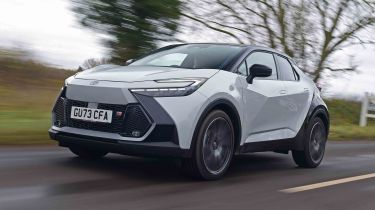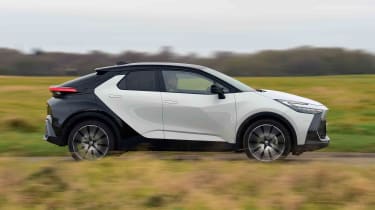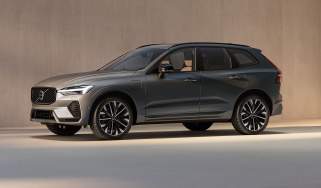Toyota C-HR review
The bold Toyota C-HR combines strong equipment levels, high efficiency, and lots of safety features, but it’ll cost you

Quick verdict
The Toyota C-HR impresses with excellent real-world efficiency, a plush cabin, and an interior filled with tech that’s easy to use. Being a modern Toyota, it comes standard with many safety features, and – like the original – its all-hybrid engine lineup means low emissions. Credit should be given to the designers for keeping the same bold styling that made the Mk1 such a hit, because this Mk2 version looks just as dramatic.
The 2.0-litre model we’ve driven so far provides plenty of performance for everyday driving, but it only comes in top GR Sport specification, which means it’s a very expensive option compared with rivals. The CH-R Plug-in Hybrid is also very expensive and is best suited to company car drivers to help keep their tax bills low. Overall, we think the well-equipped Design trim would be better value for money, even if you have to go for the less powerful 1.8 Hybrid model.
|
Key specs | |
|
Fuel type |
petrol/electric hybrid |
|
Body style |
5-door small SUV |
|
Powertrain |
1.8-litre, 4cyl petrol plus electric motor 2.0-litre, 4cyl petrol plus electric motor 2.0-litre, 4cyl petrol plus electric motor, 13.6kWh battery |
|
Safety |
5-star Euro NCAP (2024) |
|
Warranty |
3yrs/60k miles (up to 10yrs/100k miles with routine franchised dealer servicing) |
Toyota C-HR: price, specs and rivals
Did you know that the name Toyota C-HR stands for Coupe High Rider? Well, now you do. The C-HR is in its second generation, following on from the popular first-generation Toyota C-HR, sold between 2016 and 2023. It's an efficient hybrid SUV available in full and plug-in hybrid forms, and it competes with the likes of the Hyundai Kona, Honda HR-V, Kia Niro, Nissan Qashqai, Renault Captur, and Suzuki S-Cross.
Used - available now
For the first time, the hybrid C-HR gains a company-car-friendly plug-in hybrid version, following the lead of its bigger Toyota RAV4 sibling. The PHEV C-HR comes with a 13.6kWh battery pack that should be good for an all-electric range of up to 41 miles.
There are two traditional full hybrid choices: a 138bhp 1.8 Hybrid and a 194bhp 2.0 Hybrid. All engines come with a CVT automatic gearbox.
All C-HRs are well-equipped. The entry-level Icon trim gets 17-inch alloy wheels, an eight-inch touchscreen display with Android Auto and Apple CarPlay, a reversing camera, LED head lights, and a seven-inch multi-information display for the driver. Toyota Safety Sense also comes as standard, which includes adaptive cruise control, lane departure warning with lane keep assist, and road sign recognition.
Mid-range Design is the pick of the range because it adds front and rear parking sensors to ease the stress of slotting it into a tight car park bay, along with several other niceties. You get 18-inch alloys, heated front seats with power lumbar adjustment, wireless phone charging, rear-cross traffic alert, and a 12.3-inch digital instrument cluster.
The poshest Excel trim adds 19-inch alloys, LED adaptive headlights, part artificial leather and suede upholstery, a panoramic glass roof, a 360-degree camera system, a driver monitoring system, and front cross-traffic alert.
Those seeking something with a sportier look (and the more powerful 2.0-litre) might consider the GR Sport, which gets 20-inch alloys, and a contrasting roof colour. There are some additional goodies from the 64-colour ambient interior lighting, a more advanced Naneo air filtration system to filter out finer particles in the climate control system, and an uprated nine-speaker JBL sound system.
The only major downside of the C-HR is the rather stiff pricing. This Hyundai Kona-sized car starts near where that rival stops, at just under £31,500. Fancy the more powerful 2.0-litre? Then you’ll need over £40,500 for a GR Sport model. Pricing for the plug-in hybrid is slightly more reasonable, at just over £39,000, but for similar money, you could have our preferred version of the Kona Electric that’ll be even better for company car drivers paying Benefit-in-Kind (BiK) tax.
Engines, performance & drive
The Toyota C-HR is good to drive, with tight body control, direct steering, and a well-judged ride. Engine noise is still an issue while accelerating hard up to motorway speeds, but with a more powerful hybrid system, it doesn’t take as long to get up to cruising speed where you can lift off and let the engine settle down. The background hum of wind and road noise is no worse than rivals. Read more about the Toyota C-HR's engines, performance and drive…
MPG, emissions & running costs
Fuel efficiency and emissions for all regular hybrid Toyota C-HR models are much better than those of its petrol and diesel rivals. The plug-in hybrid will be an appealing company car choice, especially with up to 41 miles of electric range. You must stick with the least expensive Design trim PHEV version to avoid the surcharge for cars costing over £40,000, though. Read more about the Toyota C-HR's MPG, emissions and running costs…
Interior, design & technology
The designers of the C-HR need to be applauded for not toning down the striking looks of the original model when penning this latest version. It looks at its best in a bi-tone colour, which comes as standard with the GR Sport trim. Digital screens and plush materials abound inside the C-HR, and we approve of the continued use of physical controls for frequently used functions. Read more about the Toyota C-HR's interior, design and technology…
Boot space, comfort & practicality
While there have been some improvements, the C-HR continues to pose difficulties for those looking for a practical SUV – especially those transporting small children in car seats – due to the sloping rear roof line and rear doors that don’t open as wide as rivals. Its overall boot volume also trails its competitors, and the PHEV versions have even less capacity than the best superminis. Read more about the Toyota C-HR's boot space, comfort and practicality…
Reliability & safety
The C-HR gained the maximum five-star safety rating from crash test experts Euro NCAP, making it a safer place to put your loved ones than the four-star rated Hyundai Kona or Honda HR-V. There’s also lots of safety assistance technology provided as standard to keep you out of trouble, and we suspect that Toyota’s well-earned reputation for dependability should see the latest C-HR do well in the Driver Power customer satisfaction survey. Read more about the Toyota C-HR’s reliability and safety…
Should you buy a Toyota C-HR?
If you want extreme styling, appreciate long equipment lists, and need something highly efficient, the Toyota C-HR is a fine hybrid SUV choice. The fact it drives well and can now be had with a plug-in hybrid option just makes the deal sweeter.
However, the same compromises as before remain, with a gloomy interior for those in the back and a restrictive rear door opening that makes it harder to live with as an everyday family car. What’s more, it is more expensive than the highly accomplished Hyundai Kona, and even though there will be a PHEV model, company car drivers will be better off opting for the similarly priced all-electric Kona Electric that’ll save you even more money.












